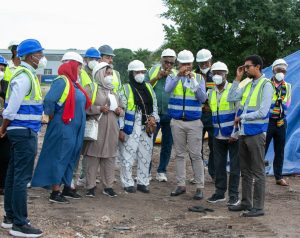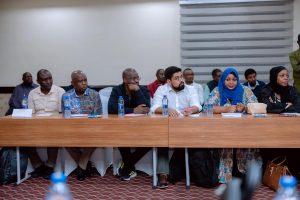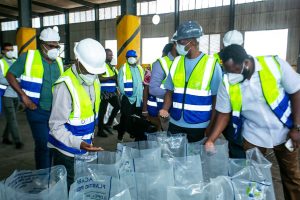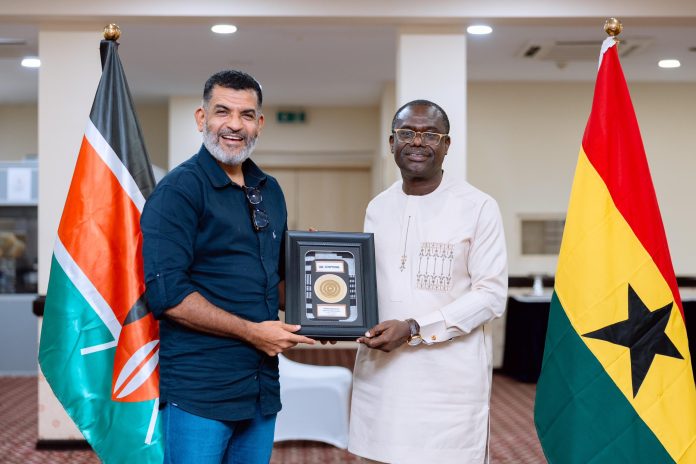To find solutions to pressing sanitation and youth unemployment challenges, the County of Mombasa, Kenya, has turned its attention to Ghana’s Jospong Group of Companies for succour.

A 26-member high-powered delegation, led by Governor H.E. Abdullswamad Sherrif Nassir, embarked on a four-day (July 29 – August 1, 2025) working tour of Ghana, seeking to study and potentially replicate Jospong’s successful sanitation blueprint.
The visit marked a continuation of strategic engagement, following the July visit of Jospong Group’s Executive Chairman, Dr. Joseph Siaw Agyepong to Kenya, where he promoted Pan-African collaboration for sanitation transformation.
Faced with growing challenges in managing solid waste, sewage and medical waste, Mombasa’s leadership is exploring how to convert these burdens into opportunities for sustainable growth and youth empowerment.
The Ghanaian model, led by the Jospong Group, has proven to be a successful example of such transformation. “We came here because we believe in African solutions to African problems. What we’ve seen here is not only innovative, but inclusive turning waste into a resource while creating real jobs for young people,” Governor Nassir said.
The delegation, comprising Kenyan MPs, administrative officials, technical staff and sanitation experts toured several of Jospong’s leading facilities in Accra and Kumasi.
These included the Accra and Kumasi Compost and Recycling Plants (ACARP and KCARP), the Kumasi Wastewater Treatment Plant, the Pantang Transfer Station, the Kpone Landfill Site and the Universal Plastic Product and Recycling Plant.
The Kenyan officials were visibly impressed by Jospong’s use of cutting-edge green technologies to handle waste at scale.

They lauded the company’s ability to not only manage waste efficiently, but to turn it into job creation avenues, particularly for youth.
“This is a model that transforms communities. It’s not just about sanitation—it’s about dignity, employment, and environmental sustainability,” said Mohamed Faki Mwinyihaj, Senator and a member of the delegation.
Back home, Mombasa County has initiated a bold new waste strategy of its own. According to Governor Nassir, the county will be divided into 600 sanitation units.
Each unit will be manned by local youth who will be salaried to manage waste collection and delivery to a central transfer station.
“In the past, waste was dumped haphazardly due to the lack of structure. Now we’re introducing order and giving jobs to our youth. This eliminates illegal cartels and puts dignity back into sanitation work,” he said.
Farida Abdallah, Chairperson of the Mombasa County Public Service Board, highlighted the potential of the Jospong model to significantly reduce unemployment.
“What Jospong has achieved here is remarkable. The number of youth employed across various facilities is something we aspire to. This model is worth replicating,” she said.

Other Parliamentarians including representatives from Likoni, Mvita, Kisauni, Changamwe and Mishi Kuma Mboko constituencies echoed similar sentiments, applauding the emphasis on job creation and environmental sustainability.
“The Jospong sanitation model aligns with our development priorities. It demonstrates that economic empowerment and climate action can go hand-in-hand,” said one MP.
Jospong’s Executive Chairman, Dr. Joseph Siaw Agyepong, reaffirmed the company’s commitment to collaborating with African governments to scale sanitation innovations continent-wide.
“We believe in partnerships that empower local talent. We are ready to work with the County of Mombasa to conduct feasibility studies, establish training regimes, and ensure knowledge transfer to build local capacity,” Dr. Agyepong stated.
He revealed that a team from Jospong will travel to Kenya to further engage stakeholders and flesh out implementation strategies.
This visit was not an isolated event. It follows earlier engagements in July when officials from Kenya’s Cabinet Secretary for Environment, Climate Change and Forestry, as well as the National Environment Management Authority (NEMA), visited Ghana to explore sustainable waste management collaborations.
The convergence of interest from different arms of Kenya’s environmental and governance sectors signals a coordinated push toward sanitation reform, using the Ghanaian experience as a model.
“This is more than just a visit. It’s part of a long-term vision. We’re building partnerships that will help Kenya transition to a circular economy and this model gives us a clear roadmap,” said the Minister for Blue Economy, Agriculture, and Livestock in Mombasa County.
The Officer in Charge of Water and Sanitation in Mombasa put it succinctly: “The Jospong Waste Management Module is a game-changer. It’s a solution that turns liabilities into assets. We believe this can be the future for Kenya and Africa.
“Mombasa has suffered for too long from the consequences of unmanaged waste, the health hazards, the environmental degradation and the social inequalities. Now we see a clear path forward. We’re grateful to the Jospong Group for showing us what is possible when innovation meets vision,” H.E. Nassir said.
With the groundwork laid, both parties now anticipate the next phase converting words into action. If successful, the partnership between Mombasa County and Jospong Group could become a continental example of how locally developed solutions can drive sustainable change, economic development, and youth empowerment across Africa.








